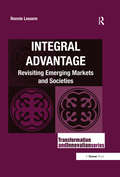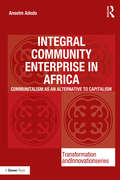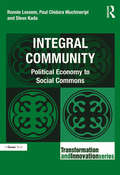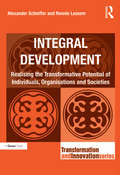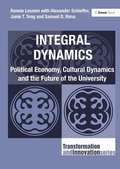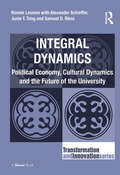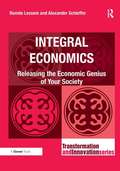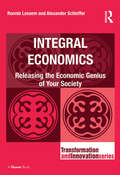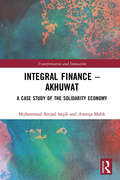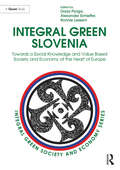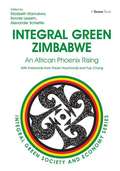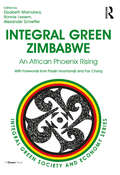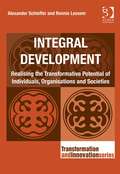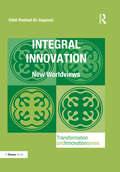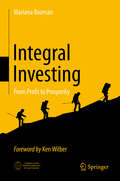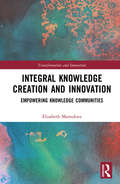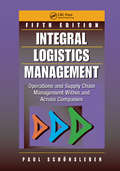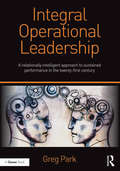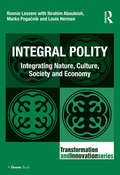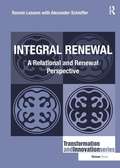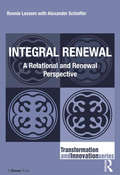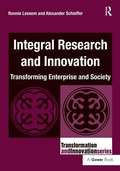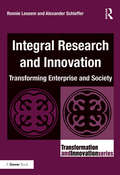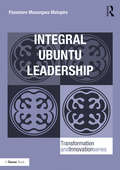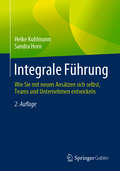- Table View
- List View
Integral Advantage: Revisiting Emerging Markets and Societies (Transformation and Innovation)
by Ronnie LessemThe BRICS countries are heralded for their double digit economic growth rates and while this has indeed been impressive, particularly in India and China, it is clear that significant social and environmental fault-lines have developed in these regions. Building on the integral heritage of Ronnie Lessem’s previous work through Trans4m’s Centre for Integral Development, here he makes the case for ’integral advantage’, a philosophy inclusive of nature and culture, technology and economy, altogether accommodated by an integral polity. Moreover, and as will be illustrated in each of the cases of the five BRICS countries, each one is an integral entity in its own particular right, and needs to be viewed, and duly evolved, as such. In the final analysis, he argues, then, that around the world, the failure of a society to develop is not due to its economic limitations, in isolation, but to the failure of nature and culture, technology and economy, to co-evolve in unison, under the rubric of an integral polity, altogether aligned with that particular society. Drawing on the approach he has developed towards the release of a society’s genius, in each case, he demonstrates how the pursuit of integral advantage may actually arise. Most specifically, he indicates how a balance between the spiritual and the material, on the one hand, and the natural and the social, on the other, needs to be achieved.
Integral Community Enterprise in Africa: Communitalism as an Alternative to Capitalism (Transformation and Innovation)
by Anselm AdodoAt a time of global economic crisis and disillusionment with capitalism, Adodo offers refreshing and positive insight into a more integral way of business management, enterprise and community development as well as holistic healing in Africa. For over three decades, Africa was the recipient of billions of dollars in aid funds that were meant to catapult the continent from undeveloped to developed status. Yet the more the aid poured in, the poorer African countries became. The devastating effect of western economic models in Africa that followed is well documented. Integral Community Enterprise in Africa exposes the limitations of existing theories, such as capitalism, socialism and communism, and shows how western theories were imposed on Africa. Such imposition of concepts and ideas is not only demeaning but also unsustainable, serving only the interest of the elite. Father Anselm Adodo argues for the need to have a southern theory to serve as an alternative to western theories. The majority of African intellectuals and activists, while criticizing existing theories, often do not provide alternative theories to address the prevalent inadequacies entrenched in conventional social, political and economic systems. This revolutionary book aims to address this lapse and proposes the theory of communitalism as a more indigenous, sustainable and integral approach to tackling the social, political, economic and developmental challenges of today’s Africa. There is an African alternative to capitalism, socialism and communism – a surer path to sustainable development in and from Africa. This is a book that is positioned at the very core of a much needed African Renaissance. A profoundly new approach to development in Africa, this is essential reading for anyone concerned with authentic development in Africa and in the world.
Integral Community: Political Economy to Social Commons (Transformation and Innovation)
by Ronnie LessemIntegral Community moves the transformation journey for enterprises and society on from the stages covered in earlier books in Gower's Transformation and Innovation Series, which describe a new macro-economic framework and which have examined alternative development with different local communities, bringing wide cultural perspectives to practical implementation of authentic or integral development. Here, the authors argue that there are two major fields of force prevailing in today's world. The one reflects our common heritage, whereby East and West, North and South are coming ever closer together - the global commons. The other reflects local and national singularity, where the notion of feeding off ancient local heritage and talent is key. They also identify four different culturally laden worldviews as Southern - humanistic, Eastern - holistic, Northern - rational, and Western - pragmatic. The enterprise and social innovation in Africa with which Lessem's co-authors are involved provides an object lesson in the sort of differentiation and integration needed in order to operate, socio-economically, with local identity and global integrity. It provides in this case a 'Southern' worldview background against which to examine communally based self-sufficiency; culturally based developmental economy; knowledge based social economy; and finally, the move towards what the authors describe as a living economy. All illustrated through a rural case, Chinyika, with which they have been intimately involved, whereby 100,000 have become self sufficient over the past five years. Integral Community should be read by academics and students of business, economics, development studies and agriculture, and by policy makers, particularly those concerned with the developing world in general and Africa in particular.
Integral Development: Realising the Transformative Potential of Individuals, Organisations and Societies (Transformation and Innovation)
by Ronnie Lessem Alexander SchiefferAlexander Schieffer and Ronnie Lessem introduce a groundbreaking development framework and process to address the most burning issues that humanity faces. While conventional top-down, outside-in development has reached a cul-de-sac, a new, integral form of development is emerging around the world. Integral Development uniquely articulates this emergent approach, and invites us to fully participate in this process. The integral approach has been researched and framed over decades of in-depth experience in transformative development education and practice all over the world. It uniquely combines four mutually reinforcing perspectives: nature and community; culture and spirituality; science, systems and technology; and enterprise and economics. Conventional development theory and practice has prioritized the latter two perspectives, neglecting the former two. This has caused massive imbalances in today’s world. The four interconnected perspectives allow for a transformative and integrated engagement with core development issues in a way that is locally relevant and globally resonant. Throughout, the practical impact of Integral Development is brought to life through highly innovative cases from around the globe, drawing on the authors` first-hand experience. This makes the book a living demonstration of the power of this pioneering approach. Integral Development shows how individual, organizational and societal developments need to be interconnected to release a society’s full potential. It shifts the responsibility for large-scale development from often-distant experts and organizations to each individual, community, enterprise and institution within the society. It is essential reading - and a call to action - for everyone concerned with the current state of local and global development.
Integral Dynamics: Political Economy, Cultural Dynamics and the Future of the University
by Ronnie Lessem Alexander Schieffer Junie T. Tong Samuel D. RimaThe theory of integral dynamics is based on the view that the development of individual leaders or entrepreneurs requires the simultaneous development of institutions and societies. It seeks a specific way forward for each society, fundamentally different from, but drawing on, its past. Nearly every natural science has been transformed from an analytically-based approach to a dynamic one: now it is time for society and culture to follow suit locally and globally. Each culture, discipline and person is incomplete and is in need of others in order to develop and evolve.
Integral Dynamics: Political Economy, Cultural Dynamics and the Future of the University (Transformation and Innovation)
by Ronnie Lessem Alexander Schieffer Samuel D. RimaThe theory of integral dynamics is based on the view that the development of individual leaders or entrepreneurs requires the simultaneous development of institutions and societies. It seeks a specific way forward for each society, fundamentally different from, but drawing on, its past. Nearly every natural science has been transformed from an analytically-based approach to a dynamic one: now it is time for society and culture to follow suit locally and globally. Each culture, discipline and person is incomplete and is in need of others in order to develop and evolve. This book sets out a curriculum for a new integral, trans-cultural and trans-disciplinary area of study, inclusive of, but extending beyond, economics and enterprise. It embraces a trans-personal perspective, linking self with community, enterprise and society, and focusing on the vital relationship between local identity and global integrity. For the government policy maker, the enlightened business practitioner, and the student and researcher into economics and enterprise, the new discipline is set out here in complete detail by a multi-national team of Gower's Transformation and Innovation Series authors. Illuminated with examples relating the conceptual to the practical, this is a text, not for a pre-modern, modern, or even post-modern era, but for what has been called our trans-modern age.
Integral Economics: Releasing the Economic Genius of Your Society
by Ronnie Lessem Alexander SchiefferThis series on business transformation and social innovation comprises a range of books informing practitioners, consultants, organization developers, and academics how businesses and other organizations set in the context of whole economies and societies can and will have to be transformed into viable 21st Century enterprises. A new kind of R&D, involving social, as well as technological innovation, needs to be supported by integrated, active and participative research in the social sciences. Focusing on new, emerging kinds of public, social and sustainable entrepreneurship originating from all corners of the world and from different cultures, books in this series will help those operating in the area of interface between business and society to mediate between the two in the way that business schools once did until, as is now argued, they lost their way and business leaders came, in many cases, to be seen as at best incompetent and at worst venal and untrustworthy.
Integral Economics: Releasing the Economic Genius of Your Society (Transformation and Innovation)
by Ronnie Lessem Alexander SchiefferWhy on earth is economics perceived to come in only one or at best two different a-cultural if not a-moral guises? There are real, and many, alternatives to the economic mainstream. The trouble is, of course, that they are hidden from us. In Integral Economics Ronnie Lessem and Alexander Schieffer pave the way for a sustainable approach to economics, building on the richness of diverse economic approaches from all over the globe. By introducing the most evolved economic perspectives and bringing them into creative dialogue they argue that neither individual enterprises nor wider society will be transformed for the better without a new economic perspective. Here, they introduce a comprehensive framework based on the same 'Four Worlds' model that is applied to enterprise and research in their earlier works. Given the richness of even mainstream economic theory reviewed in this book, let alone the variety of alternative approaches introduced, it is frustrating that policymakers and business practitioners are impoverished by a lack of apparent economic choice - between a seemingly failing capitalism and an already failed communism. The 'villains of the piece' in relation to this lack of choice are not so much the financial community and governments, though they do have much to answer, but the schools of economics and the business schools, that have created the very social ethos, the philosophical principles, and the mathematical models, that influence events. Integral Economics is partly addressed to academics and students in those very schools, who have either realized the error of their ways, or, less dramatically, are curious to explore whether our businesses and communities could be run in a different way. It will be welcomed by informed senior practitioners, eager to understand the current rethink of economic theory and practice and to discover how to position themselves, their organizations, and their society within a new framework.
Integral Finance – Akhuwat: A Case Study of the Solidarity Economy (Transformation and Innovation)
by Muhammad Amjad Saqib Aneeqa MalikThere are many misconceptions and concerns regarding Islamic societies and how Muslim countries have failed to come up with their own localised solutions to socio-economic problems in dealing with poverty alleviation and societal development. This book explores why there is so much disconnect between spirituality and enterprise development in the world today, and how a part of the Islamic world, in fact located in Pakistan, can be part of the solution rather than being central to the problem. This book builds upon Ronnie Lessem and Alexander Schieffer’s theory of ‘integral dynamics’ which works through a fourfold rhythm of the GENE. Set against a mono-cultural perspective, the authors highlight the ever-increasing and deepening divide between Western and Islamic cultures. Through the course of the book, the authors use the transformational GENE (Grounding, Emergence, Navigation, Effect) rhythm developed by Lessem and Schieffer to take readers through the 4C (Call, Context, Co-creation and Contribution) process, articulated to CAREing-4-Society. They ground their call in Akhuwat’s community of Akhuwateers (donors, beneficiaries, borrowers, volunteers and replicators), to explore alternative models of spiritually based finance through an emerging SOUL-idarity paradigm. Furthermore, through these models and Akhuwat’s CARE (Community, Awareness, Research, Embodiment) process, they put forward that encouraging community activism, raising awareness around Islamic practices of Qard-e-Hasan, institutionalising their innovative research, and finally transforming and educating the community, will provide an alternative to microfinance for poverty alleviation. Showcasing an unconventional spiritual-financial solution, deeply immersed in spirituality and infused with local moral values and traditions, this book demonstrates how poverty can be alleviated in countries around the world, specifically, in developing Muslim countries.
Integral Green Slovenia: Towards a Social Knowledge and Value Based Society and Economy at the Heart of Europe (Integral Green Society and Economy)
by Ronnie Lessem Alexander Schieffer Darja PicigaRonnie Lessem and Alexander Schieffer's Integral Green Society and Economy series has three overarching aims. The first is to link together two major movements of our time, one philosophical, the other practical. The philosophical movement is towards what many today are calling an 'integral' age, while the practical is the 'green' movement, duly aligned with that of sustainable development. The second is to blend together elements of nature and community, culture and spirituality, science and technology, politics and economics, thus serving to bring about an 'integral green' vision, albeit with a focus on business and economics. As such, the authors transcend the limitations to sustainable development and environmental economics, which are overly ecological, if not also technological, in orientation, and exclude social and cultural elements. Thirdly, this particular volume, with Darja Piciga, focuses specifically on Slovenia, as well as on Europe generally, drawing on the particular issues and capacities that this country and continent represents, particularly for sustainable development and social knowledge-based economy. The emphasis on Slovenia arose, not only because it lies at the heart of Europe, but because a specific movement for an Integral Green Slovenian Society and Economy, has been co-evolved there, by the three editors in conjunction with Slovene organisations, communities and movements, with a view to integrating existing and emerging knowledge resources, initiatives and practices into a model, as an alternative to austerity, for Slovenia and other European countries.
Integral Green Zimbabwe: An African Phoenix Rising (Integral Green Society And Economy Series #1)
by Ronnie Lessem Alexander Schieffer Elizabeth MamukwaIntegral Green Zimbabwe: An African Phoenix marks the debut of the Integral Green Society and Economy series, which links the philosophical 'integral' age with the practical 'green' movement. <P><P>The series blends elements of nature and community, culture and spirituality, science and technology, politics and economics--while this particular volume focuses specifically on Zimbabwe, as well as Southern Africa, drawing on the particular issues and capacities that this country and region represent.
Integral Green Zimbabwe: An African Phoenix Rising (Integral Green Society And Economy Series #1)
by Ronnie Lessem Alexander Schieffer Elizabeth MamukwaIntegral Green Zimbabwe: An African Phoenix Rising by Ronnie Lessem, Alexander Schieffer and Liz Mamukwa is the first book in the Integral Green Society and Economy series, a series which has three overarching aims. The first aim is to link together two major movements of our time, one philosophical, the other practical. The philosophical movement is towards what many today are calling an 'integral' age, while the practical is the 'green' movement, duly aligned with that of sustainable development. The second is to blend together elements of nature and community, culture and spirituality, science and technology, politics and economics, thus serving to bring about an 'integral green' vision, albeit with a focus on business and economics. As such, the authors transcend the limitations to sustainable development and environmental economics, which are overly ecological, if not also technological, in orientation, and exclude social and cultural elements. Thirdly, this particular volume focuses specifically on Zimbabwe, as well as Southern Africa, drawing on the particular issues and capacities that this country and region represents. The emphasis on Zimbabwe and Southern Africa transpired not only because two of the editors (Lessem and Mamukwa) are Zimbabwean in origin, but because Zimbabwe is today like a phoenix rising from the ashes, and has the opportunity to recreate itself anew.
Integral Human Development: Self, Enterprise, and Society
by Ronnie Lessem Alecander SchiefferSchieffer and Lessem introduce a groundbreaking development framework and process to address the most burning issues that humanity faces. While conventional top-down, outside-in development has reached a cul-de-sac, a new, integral form of development is emerging around the world. Integral Development uniquely articulates this emergent approach, and invites us to fully participate in this process. Integral Development combines four mutually reinforcing perspectives: nature and community; culture and spirituality; science, systems and technology; and enterprise and economics. Conventional development theory and practice has prioritized the latter two perspectives, neglecting the former two. This has caused massive imbalances in today's world. Integral Development shows how individual, organizational and societal developments need to be interconnected to overcome these imbalances and to release a society's full potential. It shifts the responsibility for large-scale development from often-distant development experts and organizations to each individual, community, enterprise and institution within the society.
Integral Innovation: New Worldviews (Transformation and Innovation)
by Odeh Rashed Al-JayyousiTechnology plays a critical role in transforming societies and economies through enhancing efficiency, connectivity and access to resources and services. The challenge remains how to harness technologies to achieve sustainable development without causing harm to human and natural capitals. Professor Odeh Rashed Al-Jayyousi argues that science, technology and innovation (STI) are underpinned by social choices and, hence, a transition to a sustainable green economy is defined by individuals’ and institutions’ decisions on how to use and apply these STI developments. It is, therefore, important to examine closely the ways in which social institutions and processes in the “integral worlds” (the different perspectives of reality) shape the priorities of technologies and the conditions under which their potential benefits can be reaped. He states that in order for technological innovation to provide a guarantee of sustainable economic development, it is necessary that a transfer of technology to developing countries becomes a basic principle of national development policies, and that they, in turn, are open to adopting an explicit long-term application of technological innovation. Integral Innovation: New Worldviews presents a conceptual framework for the evolution of technology and innovation from a historical and cultural perspective. It provides an analysis of the role of innovation and technology in sustainable development and introduces a number of international case studies, which shed light on the social learning processes for knowledge co-creation and innovation culture. It is essential reading for those interested in innovation and technology management.
Integral Investing: From Profit to Prosperity
by Mariana BozesanToday, early-stage investors and entrepreneurs find themselves in a dilemma in which they must choose between profit and impact; between traditional, for-profit-only models on the one hand, and multiple-bottom-line structures with a positive social or environmental impact on the other. To help them, and in response to a time in which climate change, exponentially growing technologies, and COVID-19 are calling into question humanity’s priorities, the author proposes a new investment paradigm, namely Integral Investing.Integral Investing incorporates and transcends the best practices of both traditional venture capital and impact investing. It provides a seamless integration and shows how technological progress need not be our rival, but can instead be our ally in ensuring the prosperous society we all want. Drawing on her own investments and stellar track record in Silicon Valley and Germany over the past 25 years, the author reveals the mechanism of Integral Investing. At the heart of it is a powerful, 360-degree de-risking tool called the Theta Model, which reveals how to make smart investment decisions based on the comprehensive integration of traditional due-diligence criteria, sustainability metrics, and assessments of the founders’ and team culture. But it doesn’t stop there. In turn, the book demonstrates how to use human-centered AI to scale and digitalize the investment process. The goal here is to accelerate the use of exponential tech, capital, and consciousness leadership to transition to a sustainable global society: a process the author refers to as the Investment Turnaround. The 21 principles of Integral Investing, which she defines using Ken Wilber’s Integral Theory, lead to her manifesto on how to implement the UN Sustainable Development Goals within Planetary Boundaries by 2050 through early-stage investing and entrepreneurship. Similar to the 15th century, when the Medicis inspired the Renaissance, today humanity is once again at a crucial turning point where pioneering financiers, investors, entrepreneurs, and other committed individuals have the opportunity to leave behind the legacy of a prosperous society. This handbook provides a source of inspiration, and shows how self-actualization, a positive mindset, and a consciousness that is backed by a world-centric desire can become the driving force for solving the global grand challenges.
Integral Knowledge Creation and Innovation: Empowering Knowledge Communities (Transformation and Innovation)
by Elizabeth MamukwaThis work focuses on the creation of new knowledge, and how this has happened throughout all ages, as far back as the time of ancient philosophy to today. A product of integral research, it covers the process of creating new knowledge, leveraging existing knowledge, sometimes resulting in cutthroat innovations. It also includes knowledge systems such as conventional university systems to Mode 2 university concepts, culminating on integral research to innovation. This book will help the reader to realise that the subject of knowledge creation is no longer business as usual. Many innovations have been created for human benefit in general, but such innovations may have benefited only parts of society. The challenge in the world is that, while new innovations may be brilliant, there are sections of society who continue to slip into poverty. Modern innovators must also consider such communities and come up with appropriate interventions. This book will open the eyes of innovators to new possibilities. In addition, the subject of knowledge should not be an elitist affair. One may stand to gain a lot by seeing the knowledge in other people, whatever their station in life. This realisation can enable serious innovators to widen their scope in terms of the sources of existing knowledge which can be improved and reassessed as new knowledge. Such existing knowledge can be identified by engaging the very communities that may be affected by a problem or challenge. Such communities will have had time to interrogate their situations and think of possible solutions to such, though they might not have the economic capacity to implement such solutions. This is always a useful starting point if one is seeking a solution to a community problem. This book will be useful to students interested in the subject of knowledge and innovation, from under-graduate to PhD level. It will also benefit captains of industry, executives and managers who are interested in improving their knowledge improvement cycles in their companies.
Integral Logistics Management: Operations and Supply Chain Management Within and Across Companies, Fifth Edition
by Paul SchönslebenSimplified theories, magic formulas, and popular catchwords will only take you so far when dealing with real-world logistics, operations, and supply chain management scenarios. The complex reality of day-to-day operations in organizations within industry and the service sector demands highly diligent work.Integral Logistics Management: Operations and Supply Chain Management Within and Across Companies, Fifth Edition prepares students to tackle the logistical, planning, and managerial challenges they’ll face on the job. It covers both the theoretical and practical aspects of the differing characteristics, tasks, methods, and techniques of planning and control in company logistics. Updates to this edition include: An additional chapter on supply chain design, encompassing a major section on the integrated design of production, distribution, retail, service, and transportation networks An extended section on sustainability in supply chains, comprising the measurement of environmental performance An expanded chapter on product families and one-of-a-kind production, containing new methods for the "engineer-to-order" production environment New sections on the use of available-to-promise and capable-to-promise methods, as well as the use of enabling technologies toward personalized production The book examines the logistical characteristics of product variety, including made-to-order, assemble-to-order, engineer-to-order, and additive manufacturing for personalized orders. The material in the text covers most of the key terms in the five CPIM modules contained in the APICS CPIM Exam Content Manual, as well as in the CSCP program—making it an ideal self-study resource. As with the previous edition, the text provides readers with online access to Interactive Macromedia Flash elements and other helpful downloads. The book’s website has been updated with further learning materials and the comprehensive index has also been expanded. Summaries, key words, cases, and exercises are included in each chapter.
Integral Operational Leadership: A relationally intelligent approach to sustained performance in the twenty-first century
by Greg ParkThroughout Integral Operational Leadership, Park acknowledges that the principles, perspectives and priorities highlighted in his first book Collaborative Wisdom: From Pervasive Logic to Effective Operational Leadership must be translated into practical and operational guidelines. Part I of this new volume briefly revisits the theory and concepts introduced in Collaborative Wisdom and brings to centre stage an alternative organisational framework and culture which has long operated on the sidelines in many business sectors. The substantive content of this volume, however, is dedicated by way of case studies and exercises to offering insights that encourage and facilitate effective day-to-day decision making. This book creates a logical and robust chain from the hidden, often forgotten, subconscious and intuitive element of the leadership cognitive process, to the daily issues, decisions, practices and actions of leaders within the operational environment. It demonstrates how the existence of a collaborative wisdom can influence the implementers, as well as the policymakers within the organisational leadership cadre. Integral Operational Leadership provides support for industry professionals who are seeking to develop their organisational capabilities and performance through clear operational leadership. This book concerns itself with an alternative and 'progressive' leadership logic based upon perspectives, priorities and practices considered more attuned to the realities of the twenty-first century environment within which the business organisation operates.
Integral Polity: Integrating Nature, Culture, Society and Economy (Transformation and Innovation)
by Ronnie Lessem Ibrahim Abouleish Louis HermanReleasing the genius of an individual, an enterprise and a society is a central pre-occupation of the contemporary business environment. A fascinating approach to how we can begin to tackle this challenge is presented by the authors of Integral Polity. Integral spirituality, integral philosophy and the integral age, at an overall or holistic level of consciousness, has therefore become a strong enough idea to form the genesis of a movement over the course of the last half century. Taking as a starting point the ground-breaking work of the Trans4m Centre for Integral Development this book applies such an ’integral’ notion to the realms of business, economics and enterprise. To be successful, an integral approach must recognise the nuances of its environment - an integral approach in India is different from that in Indonesia, or Iceland, and they may in fact complement rather than conflict. Therefore this book also provides a fascinating alignment of such ’integrality’ with, and between different ’southern’ and ’eastern’, ’northern’ and ’western’ worlds. Using case studies ranging across the globe this review of a newly integral theory and practice provides a new lease of life to what may increasingly be perceived as the self-seeking, insulated and occasionally violent and corrupt, realm of the political.
Integral Renewal: A Relational and Renewal Perspective
by Ronnie Lessem Alexander SchiefferIn 2010 Ronnie Lessem and Alexander Schieffer published their seminal work on Integral Research and Innovation, whereby they identified the four R's: relational and renewal, reason and realization-based research paths that all together encompass the major qualitative research methods and methodologies. Transformative masters and PhD programs are focused on the 'Global South', where the vast majority of the world's population is based, most people with whom the authors deal select the relational research path, and the path of renewal, over and above the paths of reason and realization. The focus of Integral Research is on these two latter paths, now interconnected with integral enterprise and economics.
Integral Renewal: A Relational and Renewal Perspective (Transformation and Innovation)
by Ronnie Lessem Alexander SchiefferIn 2010 Ronnie Lessem and Alexander Schieffer published their seminal work on Integral Research and Innovation, whereby they identified the four R’s; relational and renewal, reason and realization based research paths that altogether encompass the major qualitative research methods and methodologies. Within each path they identified a trajectory from origination to transformation via foundation and emancipation. However these paths, underlying the research process, conventionally termed 'method', were disconnected from the integral economic and enterprise content, conventionally termed 'literature', with which they were concerned. In this book, Integral Renewal they seek to remedy such, in two major respects. As transformative masters and PhD programs are focused on the 'Global South', where the vast majority of the world’s population is based, as well as those developmental agencies focused on such, the great majority of the people with whom the authors deal select the relational research path, and the path of renewal, over and above the paths of reason and realization. The focus of this book will be on these two paths of integral research, now interconnected with integral enterprise and economics. Uniquely, the authors pursue research and innovation in a systematic way. In that respect, while their prior Integral Research book still provides the research foundation for the four southern and eastern, northern and western paths, this book will focus on the former two relational (southern) and renewal (eastern) from the combined perspectives of research process and economic and enterprise content.
Integral Research and Innovation: Transforming Enterprise and Society
by Ronnie Lessem Alexander SchiefferAt a time when business practitioners and others responsible for organizational development are desperate for usable knowledge the authors of this book contend that social science research is failing to support business and management. In Integral Research and Innovation, they explain how research has to be transformative, rather than just informative if it is to contribute usefully to building integrated and sustainable enterprises. Drawing on their experience of environments where researchers and practitioners do engage constructively, resulting in research that is active, participative, and genuinely innovative, Professor Lessem and Dr Schieffer are in territory that is far beyond that covered by standard works on research methodology.
Integral Research and Innovation: Transforming Enterprise and Society (Transformation and Innovation)
by Ronnie Lessem Alexander SchiefferThe core question underlying Integral Research and Innovation is: 'How can social research be turned into social or indeed "integral" innovation?' Complementing their acclaimed Transformation Management, this second book in the Transformation and Innovation Series explains how the knowledge creation that underpins transformative processes occurs. The authors show how research has to be transformative, rather than just informative if it is to contribute usefully to building integrated and sustainable enterprises. At a time when business practitioners and others responsible for organizational development are desperate for usable knowledge the authors contend that social science research is failing to support business and management generally. Instead, academic researchers engage in esoteric arguments about research methodology which do not contribute usefully to the resolution of real world problems. Drawing on their experience of environments where researchers and practitioners do engage constructively, resulting in research that is active, participative, and genuinely innovative, Professor Lessem and Dr Schieffer are in territory that is far beyond that covered by standard works on research methodology. This is a book not just for academics and researchers wanting to make a meaningful contribution, but also for reflective practitioners from the corporate organizational, and consultancy based worlds who operate in the area of interface between business and management, education, learning, and society, and who need to know how research can be used to make a real difference.
Integral Ubuntu Leadership (Transformation and Innovation)
by Passmore Musungwa MatupireThe four worlds as we know them today, the North, West, South and East, are out of balance. The West and the North generally dominate on a global scale while the South and the East lag behind. This also happens at individual, societal and organisational levels. It is clear that there is a need to change the way we lead our organisations in business and the way we think about leading in politics. Here is a comprehensive exploration of the Integral Leadership challenges of the twenty-first century. The author combines the African philosophy of Ubuntu or humanness, the cornerstone of African thought and life, with the concept of Integral Leadership, with particular reference to Lessem and Schieffer’s combining, in their 2010 book Integral Research and Innovation, of nature and community, culture and spirituality, science and technology, and politics and economies. This connectedness in the new paradigm of wholeness and relatedness goes beyond the relationships of human beings alone and involves experiences with nature and community. Leadership is viewed from an indigenous and exogenous perspective, bringing together a newly Integral approach, which will also introduce industry ecology and knowledge ecology as an evolution of the Ubuntu philosophy. The author offers a unique forum through which to commit to paper the operationalisation of the Integral Ubuntu Leadership model in catalysing development efforts and in CARE-ing for communities and societies.
Integrale Führung: Wie Sie mit neuen Ansätzen sich selbst, Teams und Unternehmen entwickeln
by Heike Kuhlmann Sandra HornMit Integrale Führung erhalten Führungskräfte sowie Coaches, Trainer und Berater ein wertvolles Grundlagenbuch, das die Tür zu neuen Denkmodellen und zu einem ganzheitlich orientierten Bewusstsein öffnet. Mithilfe der integralen Metalandkarte AQAL können Sie auch komplexe Anforderungen besser bewältigen. Neue Modelle und Tools sowie zahlreiche Praxisbeispiele geben Ihnen konkrete Anregungen, um die oft unbewussten, aber großen Potenziale auf allen Ebenen zu realisieren: für Mitarbeiter, Teams, Organisationen und für Sie selbst.Die 2. Auflage wurde erweitert um agile Formen der Zusammenarbeit, neue Organisationsformen wie Holacracy und Methoden, die Organisationen bei der Suche nach evolutionärem Sinn unterstützen. Sie erfahren, wie diese neuen Ansätze zu Ihrem Unternehmen passen und was bei der Umsetzung zu berücksichtigen ist.Insgesamt möchte das Buch zu einem wirkungsvolleren Miteinander anregen, zu mehr Potenzialentfaltung und Mut, neue Wege zu gehen, um so die Zukunft innovativ und nachhaltig zu gestalten.
